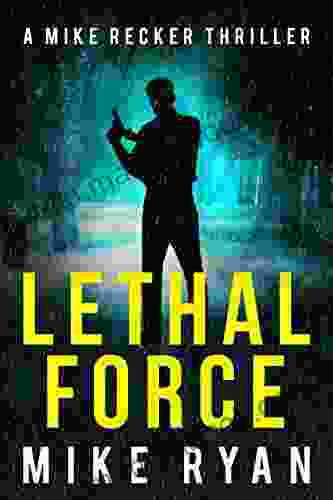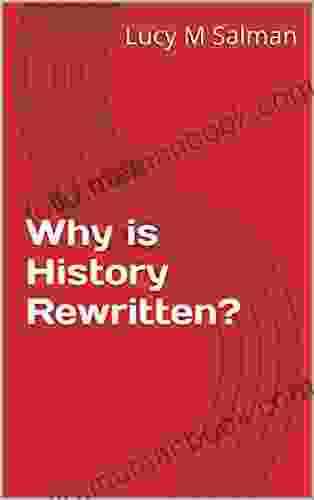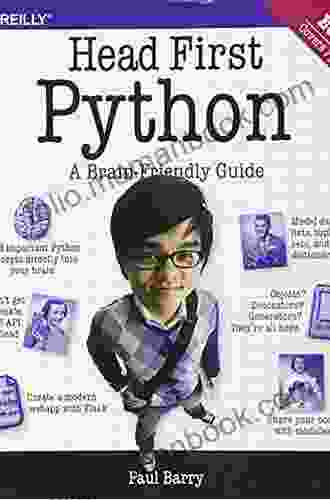Why Is History Rewritten? Tim Severin Explores the Motivations and Consequences


5 out of 5
| Language | : | English |
| File size | : | 655 KB |
| Text-to-Speech | : | Enabled |
| Screen Reader | : | Supported |
| Enhanced typesetting | : | Enabled |
| Word Wise | : | Enabled |
| Print length | : | 17 pages |
History is not a static entity - it is constantly being revised and rewritten as new evidence comes to light and interpretations change. But why is history rewritten? What are the motivations behind it, and what are the consequences?
In this article, Tim Severin explores the reasons why history is often rewritten and the impact it can have on our understanding of the past.
The Motivations for Rewriting History
There are many different reasons why history is rewritten. Some of the most common motivations include:
- To correct errors and omissions. As new evidence comes to light, historians may need to revise their understanding of the past. This can lead to changes in the way that history is written and taught.
- To reflect changing interpretations. As our understanding of the world changes, so too does our interpretation of history. This can lead to new perspectives on the past and new ways of understanding historical events.
- To promote a particular agenda. History can be used to promote a particular political or ideological agenda. This can lead to the selective presentation of evidence and the suppression of dissenting views.
The Consequences of Rewriting History
Rewriting history can have a number of consequences, both positive and negative. Some of the potential benefits include:
- A more accurate understanding of the past. By correcting errors and omissions, rewriting history can help us to gain a more accurate understanding of the past.
- A more nuanced understanding of the past. By reflecting changing interpretations, rewriting history can help us to develop a more nuanced understanding of the past and to see it from multiple perspectives.
However, there are also some potential risks associated with rewriting history. Some of the potential drawbacks include:
- Historical revisionism. Historical revisionism is the deliberate attempt to reinterpret the past in order to promote a particular political or ideological agenda. This can lead to the distortion of history and the suppression of dissenting views.
- Historical amnesia. Historical amnesia is the forgetting of important historical events and figures. This can lead to a loss of our collective memory and a diminished understanding of the past.
Rewriting history is a complex and controversial issue. There are many different reasons why history is rewritten, and there are both potential benefits and risks associated with it. It is important to be aware of the motivations behind the rewriting of history and to be critical of the ways in which it is presented. By ng so, we can help to ensure that history is used to promote a better understanding of the past, not to distort it.
About the Author
Tim Severin is an English historian and explorer who is known for his work on the history of exploration and navigation. He is the author of numerous books, including The Brendan Voyage, The Sindbad Voyage, and The Viking Voyage.
5 out of 5
| Language | : | English |
| File size | : | 655 KB |
| Text-to-Speech | : | Enabled |
| Screen Reader | : | Supported |
| Enhanced typesetting | : | Enabled |
| Word Wise | : | Enabled |
| Print length | : | 17 pages |
Do you want to contribute by writing guest posts on this blog?
Please contact us and send us a resume of previous articles that you have written.
 Top Book
Top Book Novel
Novel Fiction
Fiction Nonfiction
Nonfiction Literature
Literature Paperback
Paperback Hardcover
Hardcover E-book
E-book Audiobook
Audiobook Bestseller
Bestseller Classic
Classic Mystery
Mystery Thriller
Thriller Romance
Romance Fantasy
Fantasy Science Fiction
Science Fiction Biography
Biography Memoir
Memoir Autobiography
Autobiography Poetry
Poetry Drama
Drama Historical Fiction
Historical Fiction Self-help
Self-help Young Adult
Young Adult Childrens Books
Childrens Books Graphic Novel
Graphic Novel Anthology
Anthology Series
Series Encyclopedia
Encyclopedia Reference
Reference Guidebook
Guidebook Textbook
Textbook Workbook
Workbook Journal
Journal Diary
Diary Manuscript
Manuscript Folio
Folio Pulp Fiction
Pulp Fiction Short Stories
Short Stories Fairy Tales
Fairy Tales Fables
Fables Mythology
Mythology Philosophy
Philosophy Religion
Religion Spirituality
Spirituality Essays
Essays Critique
Critique Commentary
Commentary Glossary
Glossary Bibliography
Bibliography Index
Index Table of Contents
Table of Contents Preface
Preface Introduction
Introduction Foreword
Foreword Afterword
Afterword Appendices
Appendices Annotations
Annotations Footnotes
Footnotes Epilogue
Epilogue Prologue
Prologue Lucy Ashford
Lucy Ashford Christina Escamilla
Christina Escamilla Vinayak Venkataraman
Vinayak Venkataraman Alastair Reynolds
Alastair Reynolds Vicki Cobb
Vicki Cobb Susan Harris
Susan Harris Elaine Kahn
Elaine Kahn Simone Mueller
Simone Mueller Kia Moore
Kia Moore Thomas Greanias
Thomas Greanias Paul Barry
Paul Barry Mark Shepard
Mark Shepard Anthony R Mc Collin
Anthony R Mc Collin Jaan Kross
Jaan Kross Mel Dutton
Mel Dutton Jay Calderin
Jay Calderin Alexander Pushkin
Alexander Pushkin Concepcion Molina
Concepcion Molina Christina Tosi
Christina Tosi Lawson Mcdowell
Lawson Mcdowell
Light bulbAdvertise smarter! Our strategic ad space ensures maximum exposure. Reserve your spot today!

 Jaime MitchellLethal Force: Unveiling the Silencer 11, a Stealthy Weapon of Unparalleled...
Jaime MitchellLethal Force: Unveiling the Silencer 11, a Stealthy Weapon of Unparalleled... Darren BlairFollow ·5.5k
Darren BlairFollow ·5.5k Charlie ScottFollow ·7.6k
Charlie ScottFollow ·7.6k Terry BellFollow ·11.6k
Terry BellFollow ·11.6k Stanley BellFollow ·15.8k
Stanley BellFollow ·15.8k Blake BellFollow ·17.2k
Blake BellFollow ·17.2k Isaac AsimovFollow ·7.8k
Isaac AsimovFollow ·7.8k Dakota PowellFollow ·18.8k
Dakota PowellFollow ·18.8k Vladimir NabokovFollow ·7k
Vladimir NabokovFollow ·7k

 Dean Cox
Dean CoxHow to Make Decisions Easily & Effortlessly: The...
The Different Types of Decisions There...

 Gustavo Cox
Gustavo CoxThe End of World War II and the Birth of Baseball's...
The end of...

 Patrick Rothfuss
Patrick RothfussThe Dantes: An 11-Family Saga of Billionaires, Soulmates,...
The Dantes is an epic family saga that follows...

 Dylan Mitchell
Dylan MitchellSuper Friends: The Animated Adventures That Defined a...
In the vibrant landscape of American...

 Jamal Blair
Jamal BlairCollege For Students With Disabilities: We Do Belong
College can be a...
5 out of 5
| Language | : | English |
| File size | : | 655 KB |
| Text-to-Speech | : | Enabled |
| Screen Reader | : | Supported |
| Enhanced typesetting | : | Enabled |
| Word Wise | : | Enabled |
| Print length | : | 17 pages |










